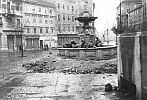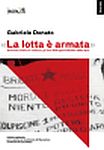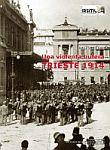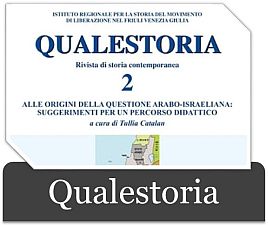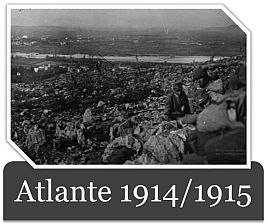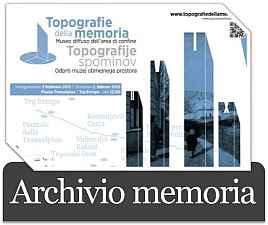
Comunismi di frontiera. I partiti comunisti nell̓area Alpe-Adria 1945-1955
Communism on the Borders. Communist Parties in the Alps-Adriatic Region 1945-1954
a cura di Patrick Karlsen e Karlo Ruzicic-Kessler
Indici e Abstracts
| Qualestoria anno XLV, N.ro 1, Giugno 2017 | ||||
| Rivista di storia contemporanea | ||||
| Comunismi di frontiera. I partiti comunisti nell̓area Alpe-Adria 1945-1955 Communism on the Borders. Communist Parties in the Alps-Adriatic Region 1945-1954 a cura di Patrick Karlsen e Karlo Ruzicic-Kessler | ||||
| Liliana Ferrari, Tristano Matta, Anna Maria Vinci | Ricordo di Giovanni Miccoli | 7 | ||
| Patrick Karlsen, Karlo Ruzicic-Kessler | Introduzione. Comunismi di frontiera. I partiti comunisti nell’area Alpe-Adria 1945-1955 | 13 | ||
| Studi e Ricerche | Studies and researches | |||
| Karlo Ruzicic-Kessler | Comunismi di frontiera: l’Alto Adige e la Venezia Giulia in una prospettiva comparata - Communism on the borders: South Tyrol and Julian March in a transnational perspective | 19 | ||
| Maximilian Graf | The Austrian Communist’s dealing with the Ideological and Territorial Conflicts in the Alps-Adriatic Region (1945-1954) | 43 | ||
| Wolfgang Mueller | The USSR and the Fate of Austrian Communism 1944-1956 | 63 | ||
| Petar Dragišić, Saša Mišić | I Partiti comunisti italiano e jugoslavo durante il conflitto jugoslavo-sovietico del 1948-1949 nelle fonti diplomatiche jugoslave – The Yugoslav and Italian Communist parties during the Yugoslav-Soviet conflict of 1948-1949 in the Yugoslav diplomatic sources | 89 | ||
| Borut Klabjan, Ondřej Vojtěchovský | Incontri comunisti. Solidarietà internazionale e interessi nazionali fra Trieste e Praga ai tempi della guerra fredda - Communist interactions. International Solidarity and National Interests between Trieste and Prague at the Time of the Cold War | 101 | ||
| Patrick Karlsen | La «terra di mezzo» del comunismo adriatico alla vigilia della rottura fra Tito e Stalin - The «middle earth» of Adriatic communism in the eve of the rift between Stalin and Tito | 123 | ||
| Note critiche | ||||
| Nevenka Troha | La fratellanza italo-slava. Osservazioni sul ruolo degli italiani nell’Unione antifascista italo-slava | 139 | ||
| Federico Tenca Montini | Rassegna di «Politička misao», numeri 51 (5/2014) e 52 (1/2015) | 149 | ||
| Luca G. Manenti | Scheda 900fest | 159 | ||
| Gli autori di questo numero | 163 | |||
Gli autori di questo numero
Petar Dragišić (1975), ha conseguito il dottorato in Storia all’Università di Vienna - Institut für Osteuropäische Geschichte. È ricercatore presso l’Istituto per la storia contemporanea della Serbia a Belgrado (Institut za noviju istoriju Srbije). Nel 2013 è stato visiting fellow al Centro per gli studi dell’Europa sudorientale dell’Università di Graz. I suoi interessi di studio riguardano la politica estera jugoslava durante la guerra fredda e la migrazione di manodopera dall’ex Jugoslavia. È autore di due libri: Jugoslovensko-bugarski odnosi 1944-1949 (2007) e Odnosi Jugoslavije i Austrije 1945-1955 (2013).
Maximilian Graf (Institute for Modern and Contemporary Historical Research of the Austrian Academy of Sciences) è specializzato negli studi sulla Guerra fredda e in storia del comunismo. Nel novembre-dicembre del 2013 è stato ricercatore associate al Centro Marc Bloch di Berlino e, dall’aprile al giugno del 2017, visintig scholar all’Università di Stanford. Nel 2014 ha ricevuto il premio Karl von Vogelsang – il premio di Stato austriaco per la storia e le scienze sociali ‒, e nel 2015 il premio Dr.-Alois-Mock-Wissenschaft.
Patrick Karlsen è assegnista di ricerca presso il Dipartimento di Scienze politiche dell’Università di Trieste e direttore scientifico dell’Istituto regionale per la storia del movimento di liberazione nel Friuli Venezia Giulia. I suoi campi di ricerca principali sono la storia del comunismo internazionale e il ruolo degli intellettuali nell’elaborazione delle culture politiche del Novecento.
Borut Klabjan è Marie Sklodowska-Curie Fellow presso l’Istituto Universitario Europeo e professore associato presso l’Istituto di studi storici del Centro di ricerche scientifiche di Capodistria. Si occupa di storia politica e culturale dell’Europa centro-orientale e di storia dell’Alto Adriatico in età contemporanea. Ha curato diversi volumi e numerosi saggi in riviste scientifiche internazionali. E’ l’autore della monografia Českoslovaska na Jadranu (Capodistria 2007) uscita in traduzione ceca con il titolo Češi a Slováci na Jadranu, 1848-1948 (Praga 2014).
Saša Mišić insegna alla facoltà di Scienze politiche dell’Università di Belgrado dal 2013. I suoi interessi accademici si concentrano sulla politica estera della Jugoslavia, in particolare sulle relazioni politiche ed economiche con l’Albania e l’Italia. Fino ad ora ha pubblicato una monografia: Albanija: prijatelj i protivnik. Jugoslvoenska politika prema Albaniji u pediodu od 1924-1927 (2009), oltre a numerosi saggi.
Wolfgang Mueller è professore all’Institute of East European History dell’Università di Vienna, e membro corrispondente dell’Accademia austriaca delle scienze. Ha al suo attivo numerose pubblicazioni sulla politica estera dell’Unione sovietica e sulla storia contemporanea. Tra i suoi lavori: Die sowjetische Besatzung in Öster164 reich 1945-1955; A Good Example of Peaceful Coexistence? The Soviet Union, Austria, and Neutrality, 1955-1991; e The Revolutions of 1989: A Handbook.
Karlo Ruzicic-Kessler (Istituto di ricerca per la storia moderna e contemporanea dell’Accademia austriaca delle scienze) si occupa di relazioni internazionali e transnazionali negli anni della guerra fredda. Le sue aree di ricerca principali includono le relazioni diplomatiche e fra i partiti comunisti nella regione Alpe-Adria.
Ondřej Vojtěchovský, è ricercatore presso il dipartimento di storia della Facoltà di filosofia dell’Università Carlo di Praga. Attualmente è anche collaboratore dell’Istituto per lo studio dei regimi totalitari di Praga. Si occupa principalmente di storia della Jugoslavia, della Cecoslovacchia, delle relazioni tra paesi socialisti e tra i partiti comunisti europei. È l’autore del libro Z Prahy proti Titovi! Jugoslávská prosovětská emigrace v Československu (Praga 2012) [Da Praga contro Tito! L’emigrazione jugoslava pro-sovietica in Cecoslovacchia] che nel 2016 è uscito in traduzione croata presso l’editrice zagrebese Srednja Europa.
Abstracts
Abstract – Communism on the borders: South Tyrol and Julian March in a transnational perspective
di Karlo Ruzicic-Kessler
By comparing the consequences of post-war events on the communist world of the Julian March and South Tyrol, the essay illustrates the different perspectives of the communist parties involved in the cross-country region between Austria, Italy and Yugoslavia. At the heart of the analysis is the PCI’s strategy towards the two border regions. The Italian party sought to establish and legitimize itself as a political force in two regional scenarios. In the Julian March and Trieste, the obstacles presented to the PCI were manifold. This was due to the very dynamic foreign policy of the Government in Belgrade and its longa manus in the region, the Slovene CP, which intended to incorporate the entire Julian March into Socialist Yugoslavia. The situation in South Tyrol was very different: here, the PCI first chose a policy of strength, especially towards the initial antagonism of the Austrian CP.
Key words: communism, Julian March, South Tyrol, Trieste, border studies
Parole chiave: comunismo, area giuliana, Sud Tirolo, Trieste, frontiera
Abstract – The Austrian Communist’s dealing with the Ideological and Territorial Conflicts in the Alps-Adriatic Region (1945–1955)
di Maximilian Graf
The essay provides a detailed analysis of the Communist Party of Austria’s (KPÖ) policy in relation to the events in the Alps-Adriatic region after WWII. The territorial dispute between Austria and Yugoslavia over Carinthia shows the gap between national politics and internationalism at the heart of the strategy pursued by this communist party. In fact, while the KPÖ openly praised the achievements of Yugoslavian socialism and supported its claims on Trieste, it rejected Belgrade’s territorial demands on Austria. The relationship between the two parties, however, developed quite positively until Stalin’s break with Tito. Although part of the party was incredulous with respect to the denunciation that Tito was a traitor to communism, the KPÖ still chose the path of total alignment with Stalin’s dictation. In the case of South Tyrol, however, the Austrian party first demanded the right of self-determination and thereafter, in 1946, sought to install itself as a leading force in the region, referring to the possibility of creating a section of the KPÖ south of the Brenner. However, the PCI proved determined not to leave the rather limited reins of South Tyrolean communism in Austrian hands.
Key words: communism, Austria, Yugoslavia, border studies
Parole chiave: comunismo, Austria, Jugoslavia, studi di confine
Abstract – The USSR and the Fate of Austrian Communism 1944–1956
di Wolfgang Mueller
The essay focuses on post-war Stalinist policies towards Austria as a laboratory for strengthening Communist influence in a country on the Cold War border line. In 1945 Moscow instructed the Communist Party of Austria (KPÖ) to pursue a cautious national- front policy. Indeed, the strong distrust of a large part of the Austrian population towards Communism combined with Soviet post-war crimes in Austria contributed to the KPÖ’s electoral disaster in November 1945. From 1947 on, the KPÖ switched to a more confrontational line as was later pursued by the Kominformburo. While Soviet support for the KPÖ was strong enough to cement the latter’s image as a «Soviet party», it was never strong enough to bring the KPÖ to power.
Key words: communism, austrian communist party, Soviet union, Austria, postwar
Parole chiave: comunismo, Partito comunista austriaco, Unione sovietica, Austria, dopoguerra
Abstract – The Yugoslav and Italian Communist parties during the Yugoslav-Soviet conflict of 1948-1949 in the Yugoslav diplomatic sources
di Petar Dragišić, Saša Mišić
The essay examines Belgrade’s view on the conflict between Italian and Yugoslav communism in the stormy years between Stalin and Tito. The dialectics between these two parties, analyzed internationally and on an inter-parties basis, demonstrates how the Yugoslav government had strong doubts about the entire Italian political class, including the PCI. The question of Trieste and the Julian March had raised serious doubts about the correctness of the line brought forward by Italian communism and its leader Palmiro Togliatti. The mistrust between the two parties escalated following the Tito-Stalin split in June 1948. The essay emphasizes that Yugoslavia was always very attentive of developments in the PCI, especially in situations that could have resulted in the creation of opposition currents to the official party line.
Key words: Stalin-Tito clash, italian communist party, Yugoslavia, Palmiro Togliatti
Parole chiave: conflitto Stalin-Tito, Partito comunista italiano, Jugoslavia, Palmiro Togliatti
Abstract – Communist interactions. International Solidarity and National Interests between Trieste and Prague at the Time of the Cold War
di Borut Klabjan, Ondřej Vojtěchovský
The present essay analyses the relations between the Communist Party of the Free Territory of Trieste (CP FTT) and the Czechoslovak Communist Party in the beginning of the Cold War. Focusing on the period between 1947 and 1954 the essay shows the asymmetrical relationship between the two parties: if on one side the PC FTT was constantly seeking for recognition and support by ‘fraternal parties’ located beyond the Iron Curtain, on the other side Prague, was more reluctant in supporting this cooperation. However, it would be misleading to think that the Czechoslovak Communist Party has not supported its comrades from Trieste. Czechoslovak communists have contributed widely to the activities of the PC FTT, especially after the split between Stalin and Tito. Even if the Italian and the French Communist Parties remained among the most important Western partners, Prague’s support for the Trieste party remained crucial, constituting one of the most substantial contributions the CCP offered to ‘brother parties’ not in power.
Key words: free territory of Trieste, Czechoslovakia, communist parties, cold war
Parole chiave: Territorio libero di Trieste, Cecoslovacchia, Partito comunista, guerra fredda
Abstract – The «middle earth» of Adriatic communism in the eve of the rift between Stalin and Tito
di Patrick Karlsen
The essay examines the passages that depict the historical parable of «adriatic communism» between the end of World War II and the 1948 Tito-Stalin schism. From the picture, re-assembled with extensive use of unpublished sources from national and foreign archives, emerges a Communist movement in which the strategic variants not only intertwined, but often were deeply influenced by the national question. The key figure of the sudden changes of line that «adriatic communism» was forced to meet and, together, the catalyst of the contrasts dividing the communist movement far beyond the regional dimension, was Vittorio Vidali. The essay devotes a great deal of reflection to the policy he followed in the A-zone of Trieste’s free territory and its immediate consequences for the «adriatic communism».
Key words: Tito-Stalin clash, Vittorio Vidali, communism, Trieste, cold war
Parole chiave: scontro Tito-Stalin, Vittorio Vidali, comunismo, Trieste, guerra fredda



